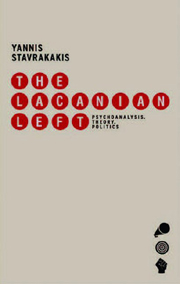Introduction: Locating the Lacanian Left
Published online by Cambridge University Press: 12 September 2012
Summary
The political Lacan
Over the last ten to fifteen years, psychoanalysis, and especially Lacanian theory, has emerged as one of the most important resources in the ongoing re-orientation of contemporary political theory and critical analysis. So much so is now acknowledged even in mainstream political science fora. For example, in a critical review essay recently published in the British Journal of Politics and International Relations – one of the journals of the UK Political Studies Association – and characteristically entitled ‘The Politics of Lack’, one reads that ‘an approach to politics drawn from Lacanian psychoanalysis is becoming increasingly popular of late among theorists … Indeed, this approach to theorising politics is today second in influence only to analytical liberalism’ (Robinson 2004: 259). This in itself is quite astonishing; nobody could have predicted it ten years ago. Yet the most striking characteristic of this trend is that the work of Jacques Lacan is increasingly being used by major political theorists and philosophers associated with the Left.
Why is this so striking? Precisely because Lacan was a practising analyst without instantly noticeable leftist leanings, without even a declared interest in political life. This is not to say that he was apolitical. One can surely detect a certain (anti-utopian) radicalism in Lacan, although its political connotations have remained largely implicit. At the theoretical level, for example, his critique of American Ego-psychology is sometimes staged in quasi-political terms, implying a rejection of a ‘society in which values sediment according to a scale of income tax’ (Lacan 1990: 110) and of the ‘American way of life’ (XI: 127).
- Type
- Chapter
- Information
- The Lacanian LeftPsychoanalysis Theory Politics, pp. 1 - 34Publisher: Edinburgh University PressPrint publication year: 2007



